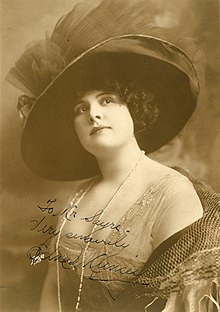Edna Munsey
Edna Munsey | |
|---|---|
 | |
| Born | June 8, 1891 |
| Died | August 11, 1951 (aged 60) New York, New York |
| Occupation | Actress |
| Years active | 1910s |
| Spouse |
Thomas J. Dillon (m. 1928) |
Edna Munsey Dillon (June 8, 1891 – August 11, 1951) was an American stage actress.
Early life
[edit]Edna Munsey was from Duluth, Minnesota, the daughter of English-born parents.[1] She trained as a pianist,[2] and graduated from the National Park Seminary in Washington, D.C.[3][4]
Career
[edit]Munsey was an actress and singer in several musicals and comedies,[5] including The Gingerbread Man (1915), The Little Cafe (1915), The Only Girl (1915–1916) by Victor Herbert,[2] and Rock-a-Bye Baby (1918) with music by Jerome Kern.[6][7] She was also seen on the vaudeville stage[8] in the United States and Canada.[1][9] She appeared in one silent film, Patsy (1917), starring June Caprice.[10] Of her soprano singing voice, a Chicago critic hailed her sweet tone but criticized her enunciation: "You can't tell whether Edna is singing in French, Latin or Greek," he complained, adding "but who cared, not on a sweltering, accursed day like yesterday, anyhow."[11]
She traveled with her mother as her chaperone and companion during her career.[12] "It is strange what erroneous ideas most people have of the life of a girl who is really in earnest on the stage," she commented in a 1915 interview, in which she described a life of discipline and sacrifice for her career.[13]
She married Thomas Dillon, a steel company executive. She died in 1951 in New York.[14]
References
[edit]- ^ a b "Bright Future in Store for Her". The Buffalo Enquirer. 1913-06-04. p. 10. Retrieved 2020-08-23 – via Newspapers.com.
- ^ a b "Edna Munsey, Popular Duluth Actress, to Appear at Lyceum in 'The Only Girl'". The Labor World. 1916-04-15. p. 2. Retrieved 2020-08-23 – via Newspapers.com.
- ^ "Miss Edna Munsey". Evening Star. 1915-06-06. p. 22. Retrieved 2020-08-23 – via Newspapers.com.
- ^ "Commencement Exercises". The Washington Herald. 1909-06-03. p. 3. Retrieved 2020-08-23 – via Newspapers.com.
- ^ "Edna Munsey Expresses of Her Philosophy on Ambition". Star Tribune. 1916-04-16. p. 33. Retrieved 2020-08-23 – via Newspapers.com.
- ^ Thorold, W. J.; Hornblow, Jr., Arthur; Maxwell, Perriton; Beach, Stewart (July 1918). "Mr. Hornblow Goes to the Play". Theatre Magazine. 28: 23.
- ^ Allen, Eugene Kelcey. "Selwyn's First Musical Show Wins Success: "Rock-a-Bye Baby" Contains Everything to Make Play a Decided Hit" Women's Wear (May 23, 1918): 8. via ProQuest.
- ^ "Making Success in Vaudeville". The Indianapolis News. 1916-10-19. p. 11. Retrieved 2020-08-23 – via Newspapers.com.
- ^ "Today's Orpheum Bill Promises to be Good". Calgary Herald. 1913-10-30. p. 13. Retrieved 2020-08-23 – via Newspapers.com.
- ^ "Personal Items about the Movie Stars". Middletown Times-Press. 1917-06-08. p. 5. Retrieved 2020-08-23 – via Newspapers.com.
- ^ Little, Richard Henry (June 17, 1913). "Edna Munsey is Heat 'Life Saver'". Chicago Examiner. p. 9. Retrieved August 23, 2020 – via NewspaperArchive.com.
- ^ "Sells a Car to 'The Only Girl'". Muskogee County Democrat. 1915-11-18. p. 6. Retrieved 2020-08-23 – via Newspapers.com.
- ^ "Personal Items about the Movie Stars". Middletown Times-Press. 1917-06-08. p. 5. Retrieved 2020-08-23 – via Newspapers.com.
- ^ "Thomas J. Dillon, 79, Steel Company Exec". Newsday. December 30, 1961. p. 38. Retrieved April 7, 2024.
External links
[edit]- Edna Munsey at IMDb
- Edna Munsey at the Internet Broadway Database
